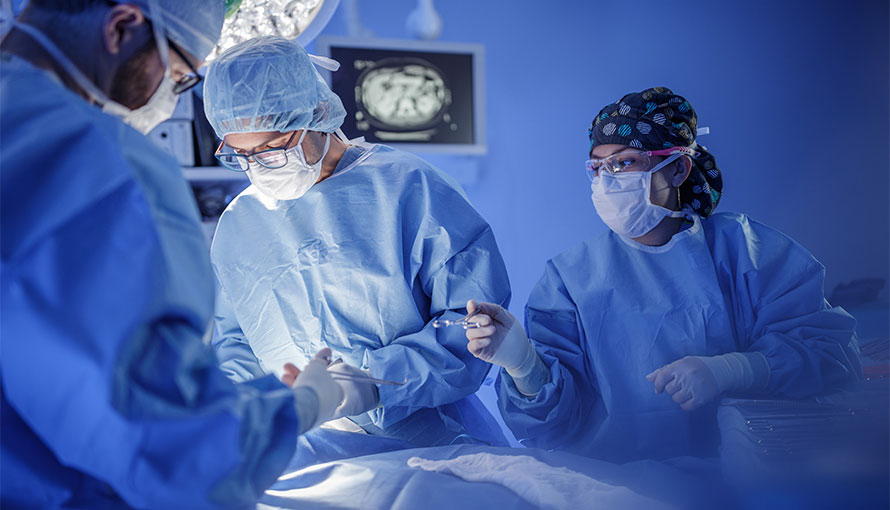Complex General Surgical Oncology (CGSO) Fellowship

Moffitt Cancer Center is the only NCI-designated Comprehensive Cancer Center based in the state of Florida. The institution has experienced remarkable growth since it was established in 1986. There are more than 11,000 surgical cases performed and over 23,000 new patients seen per year. The cancer center receives more than $70 million in federal and corporate research grants annually.
About our Program
The Complex General Surgical Oncology Fellowship at Moffitt Cancer Center is organized through the University of South Florida. We have been accredited by the ACGME since 2012. Our Fellowship is a two-year program, comprised of 18 months of required clinical rotations, four months of research and two months of dedicated experience in pathology, radiation oncology and medical oncology.
All rotations are at Moffitt facilities. The first clinical year is designed to give all fellows a core exposure to breast, melanoma, sarcoma, endocrine, GI and HPB oncology. This busy clinical year allows fellows to expand their ability to care for cancer patients in a multidisciplinary fashion. The second year allows for six additional months of clinical training and research time to develop one’s academic endeavors. Fellows may request an optional third year, dedicated to research or to obtaining additional clinical training in specific areas.
| Individual Mentoring and Professional Development Focus | |
| Excellent Research and Academic Exposure | |
| Diverse Patient Population | |
| Unique Multi-Disciplinary Departmental Structure | |
| High-Volume Operative Experience |
Our fellows are exposed to every aspect of Complex General Surgical Oncology. Trainees will see the full spectrum of pathology within each disease site. From a technical standpoint, fellows will gain experience with specialized procedures such as cytoreductive surgery and hyperthermic intraperitoneal chemotherapy (CRS/HIPEC), isolated limb infusion, percutaneous hepatic perfusion, T-VEC and CAR-T. When appropriate, we employ minimally invasive (robotic and laparoscopic) approaches for resection. Our large patient volume also allows for exposure to palliative operations and treatment of complications associated with medical therapy (specifically immunotherapy and bone marrow transplant). Our fellows graduate with an average of 450 cases and easily meet ACGME recommended case volumes.
Our departmental structure is unique in that it is disease-site-based (Breast, Sarcoma, Cutaneous, and GI Oncology). Thus, the multidisciplinary approach to cancer care is built into the very structure of the program. Each rotation contains a dedicated tumor board with participation from all disciplines including medical oncology, radiation oncology, pathology and diagnostic radiology. This allows the trainee continued exposure to sophisticated, thoughtful discussions of treatment plans.
Clinical teaching occurs continuously while on rotation. Additional didactic teaching sessions are also considered a priority. We have a weekly morbidity and mortality conference which covers quality improvement issues and specifically allows fellows to discuss important management decisions that occur during the care of a patient. Additionally, Fellows Conference is a weekly dedicated teaching session during which a fellow presents a specific topic to the group, with a faculty mentor to help highlight the important points during the discussion. These conferences help prepare our fellows for written and oral board examinations.
Our last ACGME site visit was in January 2019. We currently have no citations. Our program is approved for five positions per year starting August 2023. Many of our fellows have become leaders in academic surgical oncologic oncology, but all are experts in the multidisciplinary care of the cancer patient.
Mentoring and Research
The PD and APD meet with all fellows on a quarterly basis. These meetings allow for feedback from trainees and open dialogue about the training program. From the beginning of fellowship, we start to identify professional interests to help guide each individual to the appropriate position at graduation.
All fellows are expected to participate in research. Research interests are discussed with each fellow at the beginning of the fellowship and at academic productivity meetings. It is expected that fellows will participate in clinical research projects in the first year, as well as begin the background reading and planning that will allow the initiation of a productive research program in the second year. Opportunities exist for the fellows to work with surgical researchers in molecular biology and genetics as well as basic scientists investigating nearly every aspect of human cancer. The third-year research opportunity is encouraged for those with an interest in surgical-scientist positions, but neither mandatory nor guaranteed.
Eligibility
Applicants must be eligible for a Florida medical license, and be United States citizens or have appropriate visas qualifying them to legally reside in the United States for at least two years.
Number of Positions
5 per year
How to Apply
Applications for fellowship positions will be made through the Electronic Residency Application System (ERAS)
Contact Information
Program Director
Sean Dineen, MD
Sean.Dineen@moffitt.org
Associate Program Director
John Mullinax, MD
John.Mullinax@moffitt.org
GME Program Administrator
Beliza Rohena
Beliza.Rohena@moffitt.org
12902 USF Magnolia Drive, MCC-GME
Tampa, FL 33612
813-745-4787
Surgical Oncology
